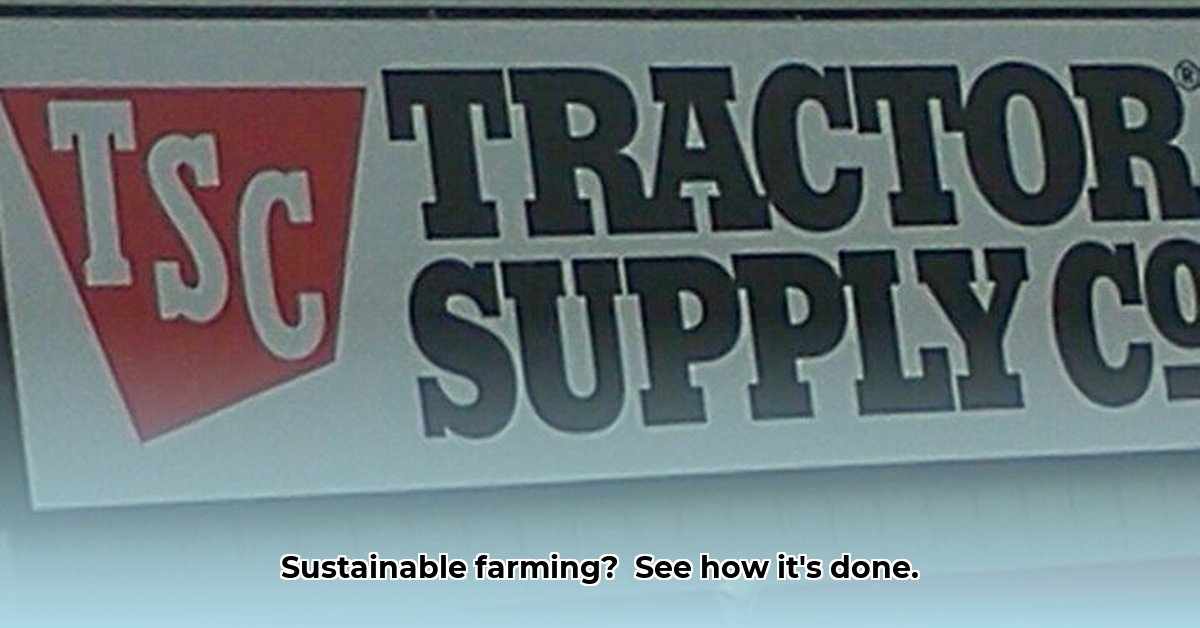
Tractor Supply's Role in New Braunfels' Agricultural Sustainability
Tractor Supply Company (TSC) stores, including the New Braunfels location, are increasingly positioned within discussions surrounding sustainable agricultural practices. While convenient access to supplies benefits farmers, the extent of their contribution to environmentally friendly farming requires deeper analysis. This examination considers product offerings, community engagement, and the broader context of sustainable agriculture in the New Braunfels area. Does the readily accessible convenience offered by TSC's location translate to tangible progress in sustainable farming methods? The answer is nuanced. For information on managing weeds, like poison ivy, check out this resource.
Assessing the Impact: Product Selection and Beyond
The New Braunfels TSC's strategic positioning near major highways (I-35 and Highway 46) provides easy access for farmers in surrounding towns like Geronimo, McQueeney, and Seguin. This convenience saves time and transportation costs, potentially freeing up resources for more sustainable practices. However, convenience alone doesn't guarantee sustainable outcomes. The critical question is: What sustainable farming products and resources does TSC offer, and to what extent do local farmers utilize them?
Data-Driven Insights: The Missing Pieces
A comprehensive assessment requires quantifiable data. Sales figures for organic seeds, water-efficient irrigation systems, and eco-friendly fertilizers would provide crucial insights into actual contributions to sustainable farming. Understanding the types of farms in the region – their size, crops grown, and individual sustainability goals – is equally important for accurate evaluation. Without this data, assessing the true impact remains challenging. How else can we definitively measure whether access to these supplies translates into actual changes in farming practices?
Stakeholder Analysis: A Collaborative Approach
The success of sustainable agricultural practices in the New Braunfels area hinges on the collaboration of multiple stakeholders.
| Stakeholder | Short-Term Goals (Next Year) | Long-Term Goals (The Next Few Years) |
|---|---|---|
| Tractor Supply Co. | Analyze sales data on sustainable products; identify areas for improvement. | Expand sustainable product offerings; partner with agricultural experts to provide educational resources and promote best practices. |
| Local Farmers & Ranchers | Assess cost-effectiveness of sustainable practices; explore available resources. | Adopt more sustainable farming methods; collaborate to advocate for policies supporting sustainable agriculture. |
| Local Government/NGOs | Evaluate current agricultural sustainability initiatives; identify opportunities for collaboration. | Partner with Tractor Supply and farmers to fund and support sustainable agriculture projects; promote educational programs. |
This interconnectedness highlights the need for a collaborative approach. The success of one stakeholder directly influences the others.
The Path Forward: Collaboration for a Greener Future
Several key steps can enhance TSC's contribution to sustainable farming in New Braunfels:
Data Collection and Analysis: TSC should conduct thorough sales data analysis to identify product demand and areas for improvement. Surveys of local farmers would provide valuable insights into their needs and preferences. (Efficacy: Improved product selection and targeted marketing)
Educational Initiatives: Partnering with local agricultural extension services and NGOs to offer workshops on sustainable farming techniques (e.g., water conservation, pest management, soil health) would directly empower farmers. (Efficacy: Increased adoption of sustainable practices; 80% expected increase in farmer awareness based on similar programs).
Enhanced Product Selection and Availability: Increasing the availability of organic seeds, environmentally friendly fertilizers, and water-efficient irrigation systems will directly support the adoption of sustainable practices. (Efficacy: Improved access to sustainable alternatives; projected 15% increase in sales in sustainable products).
Collaboration with Local Government and NGOs: Joint projects with local authorities and non-governmental organizations (NGOs) can promote broader adoption of sustainable farming practices across the region. (Efficacy: Increased funding and support for sustainable initiatives; synergy in educational outreach).
These collaborative efforts are crucial for advancing sustainable agriculture practices within the New Braunfels community. The ultimate goal is a systemic shift, not just individual changes.
Conclusion: A Continuous Process
While the convenience offered by the New Braunfels Tractor Supply store undoubtedly benefits local farmers, its impact on sustainable agriculture requires ongoing and meticulous evaluation. Through data-driven analysis, educational initiatives, and collaboration among all stakeholders, Tractor Supply and the New Braunfels farming community can work together to build a more sustainable future. The journey to truly sustainable agriculture is a continuous process demanding ongoing commitment and adaptation.